Want some general background on rooibos and honeybush teas? Read Part One of this series here
We’ve all heard of the hormone estrogen. Interestingly, it's not just the human body that produces it - we consume it all the time in different forms as plant estrogens, which usually need to be converted by the body into something it can use.
Rooibos and honeybush teas both contain these plant estrogens, so naturally there are a lot of questions about the effects of rooibos and honeybush on pregnancy, infants, and hormonal conditions.
I already wrote a post about the general health benefits of rooibos and honeybush, but I decided there needed to be a Part Two specifically about the estrogen content of these teas. So I pulled together the crucial literature on the subject to help you understand better.
Read on to find out:
- What plant estrogens in rooibos and honeybush are and what they do
- How plant estrogens affect your body in general
- How plant estrogens affect menopause
- Why the soy estrogen scare should be taken with a huge grain of salt (and what that means for your tea)
- Whether honeybush and rooibos are safe during pregnancy
- The benefits of honeybush and rooibos during pregnancy
- Why honeybush and rooibos teas can be good for infants
- Why men (mostly) don't need to worry about the estrogen in rooibos and honeybush
As always, my references are at the bottom for further reading and detail. Let’s dive in!
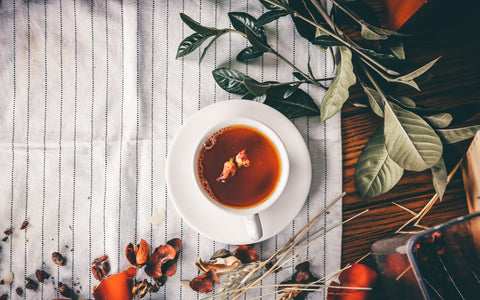
What are Phytoestrogens in Rooibos and Honeybush?
Phytoestrogens are a type of estrogen derived from plants. They are found in foods we eat every day: nuts, seeds, grains, berries, and more. Thus, they are sometimes called ‘dietary estrogens’.
These estrogens occur in varying amounts, which is why plants that are very rich in them should be consumed carefully - like with any compound that mimics a hormone in the body.
You may have even heard of the concerns about consuming large quantities of soy. This is one of the more famous examples of worries about phytoestrogens, and we'll talk more about that later. (1, 2).
Rooibos and honeybush teas both contain phytoestrogens. So what does that mean for their health impacts?
Well, phytoestrogens aren't as scary as they may sound - in fact, they can be good for you!
- A literature review (where the authors compiled several, if not hundreds, of studies to evaluate all together, referenced below) found correlations between diets high in phytoestrogens and lowered breast cancer risk and menopause symptoms (3).
- Phytoestrogens can also be anti-inflammatory and act as antioxidants (3).
- They’re also being considered as alternatives for the treatment of menopausal symptoms and cancers dependent on steroid hormones (such as breast and prostate cancer) (4).
- Phytoestrogens compete for estrogen receptor sites with the estrogen our body makes, which is called endogenous estrogen. This is helpful, as phytoestrogens can also prevent the attachment of dangerous xenoestrogens.
Xenoestrogens literally means ‘foreign estrogens’. As you may have worked out, phytoestrogens are also included in this, given that they come from plants and are not made by the human body.
However, we also consume xenoestrogens from industrial compounds such as pesticides, plastics and cosmetics (5) - which are, of course, less desirable! These include manmade and synthetic estrogens where the body has little experience dealing with them. Unlike plants, which may have been consumed for thousands of years depending on the area.
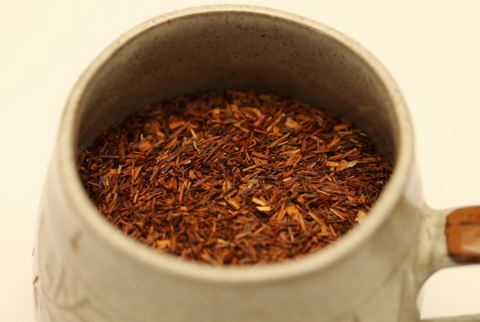
How Phytoestrogens Affect Menopause and Estrogen Dominance
The main concern people have about phytoestrogens is the fear that they might cause hormone imbalances. In cases where your body's hormones are already experiencing changes, you might be worried that phytoestrogens might mess things up even more.
Luckily, there's no need to worry. Phytoestrogens are anti-estrogenic in pre-menopause, as well as in people that are experiencing estrogen dominance (those with relatively high or ‘too much’ estrogen in the body with associated negative health effects).
To put it simply, when you’re in a state where too much endogenous (self made) estrogen is bad, phytoestrogens can actually help reduce estrogen levels.
This is because they’re thousands of times weaker than endogenous estrogen, and, as previously mentioned, they ‘compete’ in the body against the much more powerful endogenous estrogen.
On the other hand, if you need more estrogen, they can also be supplemental (5). In perimenopause (menopause transition) and post-menopause, they contribute to the body’s estrogen levels, while your own levels may be dropping off naturally due to age or other factors (5).
In short, phytoestrogens may have a mild regulating effect on your body's hormones, making them not only safe but possibly beneficial.
The Soy Phytoestrogen Scare and Why You (Mostly) Shouldn't Worry About It
Recently, people started getting concerned about the phytoestrogen content of soy products, worrying that it might cause harm to the body.
This particular scare comes from a variety of studies, which suggested that phytoestrogens may have negative effects. However, these studies only looked at particular isolated phytoestrogens (isolactones), and some of them involved giving estrogen to animals without ovaries (6).
For example, in a literature review, one phytoestrogen (an isoflavone called genistein) was isolated and injected in high doses, which led to negative effects. The researchers then administered it orally, though the amounts given were unlikely to be consumed in a balanced diet.
The authors of this article say it best, “Genistein concentrations used in these studies were much higher than the physiologically relevant doses achievable by dietary or pharmacologic intake of soy foods or supplements,” when referring to negative findings in animal trials.
Basically, you’d have to eat a LOT LOT LOT of soy cheese to hit the amount those rats were given. They even reference that pharmacological use (i.e. where you will be prescribed high doses for an ailment) would still be much lower than the amount they used on these rats. (9)
Of course, it’s more attention-grabbing to ignore these nuances in writing headlines or articles you want to ‘trend’.
The same authors pointed out that Westerners only consume about 2mg/day of genistein, compared to the 25-50 mg/day those in Asian countries consume (9). Basically, there's no way that you'd ever eat enough soy to harm yourself, even if you eat tofu every single day.
After this review of the wider literature, the authors stated that clear evidence of harm in humans from high consumption of these phytoestrogens (isoflavones, including genistein) is lacking, and that they actually have potential anticancer effects and can even help some chemo work better!
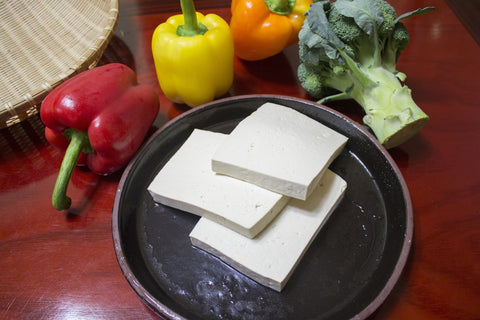
Not all phytoestrogens are alike when it comes to preventing cancer, though. Populations which have lower cancer incidence rates and higher soy consumption are mainly consuming unprocessed forms of soy, tempeh and tofu, rather than loads of concentrated soy protein isolate (or foods enriched with soy protein isolate).
Phytoestrogens normally come as a package deal, as a group, with associated “synergies” (a fancy word for beneficial intra-action). Therefore, of course, these kinds of foods don't contain such incredibly high concentrations of only one phytoestrogen, like you might find in a rat study (8).
One more thing to note: harmful results from phytoestrogen studies in animals without ovaries complicates results, because ovaries play a role in hormone production.
When the ovaries are removed, supplementing with only estrogen can increase cancer risk. This is why women without ovaries should limit their intake of foods and herbs rich in phytoestrogens (10).
Bottom line: when it comes to using these kinds of studies to determine what foods you should eat, don't compare apples and oranges!
Are Rooibos and Honeybush Safe for Pregnancy?
In a referenced rat study, researchers evaluated the phytoestrogenic activity of rooibos during pregnancy. Over 21 days, all the drinking water in the test groups was replaced with red or green rooibos - and yet, no adverse effects were seen, and no pathogenic changes occurred (6).
Put simply, the research suggested that drinking rooibos during pregnancy is safe.
In fact, the study found that both red and green rooibos showed potential for increasing female fertility, based on the fact that the test subjects experienced a thickening of the uterine wall (6).
Thickening of the uterine wall can be good, depending on the underlying cause. In this case, it indicated fertility - the uterine lining goes through phases of thickening and thinning (we don’t want it to be too thick or thin, though). A thickening of the uterine lining improves the chances of egg implantation.
Because the researchers did not note any disease-indicating changes, it meant that the thickening was a natural, nutrition-induced occurrence as a result of consuming rooibos. This thickening occurs naturally to improve pregnancy outcomes (7).
These findings aren't conclusive, however. So although the study pointed to the lack of adverse affects from drinking pure rooibos 24/7, the question about fertility requires more research.
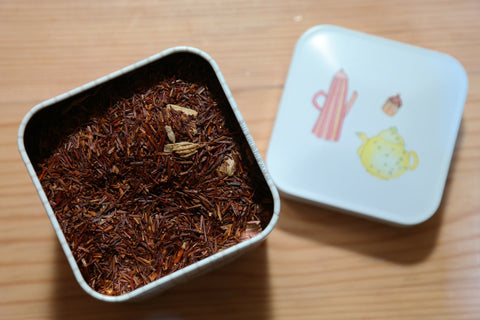
The Benefits of Rooibos and Honeybush for Pregnancy: Phytoestrogen and Beyond
While the effects of honeybush and rooibos on fertility are still up for debate, they have many other health benefits that may help with pregnancy, too.
Honeybush demonstrates estrogenic activity with relative health benefits (4) - it contains the phytoestrogenic compounds coumestans and isoflavones, which are credited with the prevention of breast, uterine, and prostate cancers, and menstrual regulation (11).
The literature seems to show these teas are beneficial for pregnancy and nursing (19, 20). Apart from phytoestrogen benefits, these teas are caffeine free, low in tannins, and full of nutrients such as antioxidants and minerals that are good for mother and baby (12).
The soothing effects of Honeybush during pregnancy can help:
- Calm the nervous system
- Promote restful sleep
- Relieve stress
- Conquer “the blues”
- Relieve headaches
Due to the low tannin levels and higher vitamin C and iron, both rooibos and honeybush support healthy hemoglobin/iron levels and address fatigue and dizziness (12).
Both herbs support digestion, and may prevent nausea in pregnancy. Like any herb, however, it’s important to drink them in moderation and be aware of any interactions with medications (12).
For more detailed info about the benefits of rooibos and honeybush, be sure to read my article about the antioxidants in these teas and what they do.
Are Rooibos and Honeybush Teas Good for Infants?
You may have heard that rooibos and honeybush make good drinks for infants and young children. There is, in fact, evidence to suggest that this is true. Some of the benefits of these teas include:
- Helping with colic
- Helping to cool a fever when mixed with juice and frozen into popsicles
- When applied in bath water or as a compress, they can help skin conditions like itchy, dry rashes and chicken pox, due to rooibos’ skin benefits (13) (14).
These teas are also both caffeine free, which means you don't have to worry about any of the risks associated with giving caffeine to young children.
However, as with any herb or supplement, it's best to consult with your doctor before encouraging your children to consume these teas.
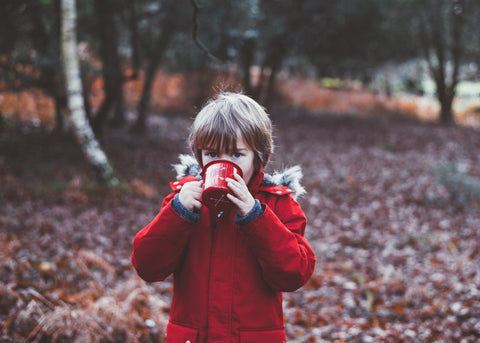
How Do Phytoestrogens in Rooibos and Honeybush Affect Men?
It seems men are worried about phytoestrogens too, even if fewer of them are pregnant!
A big part of the soy estrogen scare discussed above was related to men worrying about whether they would end up with hormonal imbalances by eating soy and soy-based meats, which have a pretty high amount of phytoestrogen (15).
Rest assured, guys; your tea isn’t going to turn you into a gal, and neither will your soy-based foods, for that matter.
Recall from above that phytoestrogens are less potent than estrogen produced by the body. Even Equol, the strongest phytoestrogen, is still 1,000 times weaker than estradiol, one of the three estrogen hormones produced by the female body (and the male body, too - estradiol is formed as testosterone breaks down) (5, 16, 17).
While consuming gads of processed soy-based meats isn’t good for anyone, consuming them in moderation is fine. There is no reason for most of the general population to avoid soy protein isolate entirely, but it should not be depended on as a staple food.
Staple foods made from soy should remain in the form of organic tofu and tempeh, as these are far less processed than vegan meat alternatives.
While there are some men who do need to follow a diet low in phytoestrogens as directed by their healthcare professionals, you cannot conceivably avoid all phytoestrogens. They’re even found in meat and milk in small amounts, due to what the animals themselves eat.
This isn't to say that rooibos and honeybush have neutral benefits for men. In addition to the general benefits discussed in part one of this post, phytoestrogens in herbal teas can actually be quite helpful for preventing prostate cancer (18).
Note that there is evidence that phytoestrogens should be avoided in excess in men with low testosterone levels (for various reasons such as aging, injury, infections and certain chemotherapies, etc) (22) (23). Follow your doctor's recommendations above all else.
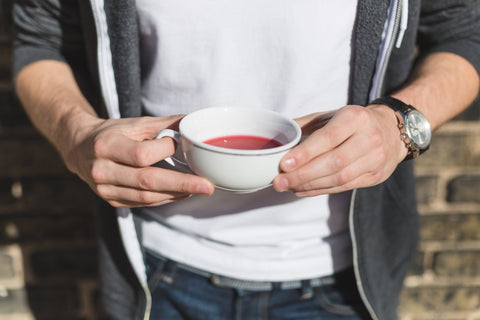
A Note on Safety
I touched on this above, but I want to say it explicitly now: While the facts conveyed in this article are backed up by solid research, I want to stress that we, here at MatchaAlternatives.com, are not medical authorities.
As with any food, herb or supplement, please talk to your qualified healthcare professional before starting anything new, especially if you are pregnant or plan to try giving these lovely teas to your little ones.
Please also remember that this information is purely for educational use, and is not meant to diagnose, treat, prescribe or in any way address any health condition or disease. Wishing you wellness!
In general, though, the daily consumption of rooibos and honeybush as a beverage has not produced any toxicity, and rat studies observing the chronic consumption of both herbs over 10 weeks did not have any negative consequences on the liver and kidneys (4).
From my understanding of the referenced literature, I think it is reasonable to say that phytoestrogens have greater health benefits when allowed to function synergistically in whole plant forms, such as tea.
This will not come as a shock to most people - various supplements and tablets are less useful to the body that consuming a healthy, balanced diet rich in those particular antioxidants, vitamins, nutrients, etc. that you may be seeking.
A Note from the Herbalist

I adore rooibos and honeybush for their deliciously soothing flavors, but the best part is that they're extremely good for you, too. If you want more general facts about rooibos and honeybush, be sure to check out part one of this series!
Here are some of my favorite ethically sourced rooibos and honeybush selections from Matcha Alternatives:
|
Intro to Rooibos & Honeybush Organic Bundle Dying to try these super healthy teas? This trio of ethically-sourced organic honeybush, red rooibos, and green rooibos teas has you covered! |
Sweet Dreams Chamomile Honeybush We blended our pure honeybush tea with gorgeous chamomile to create a delicately sweet bedtime drink you won't find anywhere else! |
Matcha Alternatives' Rooibos and Honeybush Collection Want to find your perfect rooibos or honeybush match? Check out our huge selection of delicious, ethically sourced tea! |
|
~
Read more:
|
~
Read more:
|
~
Read more:
|
| Explore our Tea Science & Lifestyle blog | | | Subscribe to the MA Blog to save 15%! |
Disclaimer
All of the information regarding the herbs, botanicals, minerals, vitamins, etc., is information drawn from traditional use data or academic research and should be regarded as such. If you, the reader, has a health or medical concern, please consult your healthcare professional. The information found here is not meant to diagnose, treat, prescribe or cure and has not been evaluated by the FDA. This information is for educational purposes only.
References for Estrogen in Rooibos and Honeybush Tea
- "Herbs and Phytoestrogens." National Women's Health Network, 2015.
- Berkheiser, Kaitlyn. "11 Estrogen-Rich Foods." Healthline, August 23, 2019.
- Patisaul, Heather, and Wendy Jefferson. "The pros and cons of phytoestrogens." Frontiers in Neuroendocrinology, Oct. 2010. doi: 10.1016/j.yfrne.2010.03.003
- Joubert, E., et. al. "South African herbal teas: Aspalathus linearis, Cyclopia spp. and Athrixia phylicoides—A review." Journal of Ethnopharmacology, 2008.
- Marciano, Marisa. "Phytoestrogens." The Naturopathic Herbalist, n.d.
- Monsees, T.K., and C.S. Opuwari. "Effect of rooibos (Aspalathus linearis) on the female rat reproductive tract and liver and kidney functions in vivo." South African Journal of Botany, May 2017.
-
Richter, Kevin, et. al. "Relationship between endometrial thickness
and embryo implantation, based on 1,294 cycles
of in vitro fertilization with transfer of two
blastocyst-stage embryos." Fertility and Sterility, Jan. 2007 - Patisaul, Heather, and Wendy Jefferson. "The pros and cons of phytoestrogens." Frontiers in Neuroendocrinology, Oct. 2010. doi: 10.1016/j.yfrne.2010.03.003
- Spagnuolo, Carmela, et. al. "Genistein and Cancer: Current Status, Challenges, and Future Directions." Advances in Nutrition, July 2015.
- "Surgical Menopause: Should You Take Estrogen After Your Hysterectomy?" Web MD, June 21, 2020.
- Iwu, M. (2014). Handbook of African medicinal plants (2nd ed., p. 201). Boca Raton, FL: CRC Press Taylor and Francis Group.
- "Is it Safe to Take Rooibos & Honeybush tea during Pregnancy?" Podromal Labor Guide, Dec. 26, 2019.
- Matambo, Josh. "Using Rooibos." Dr. Josh Matambo, n.d.
- Palmer, Linda. "The perfect kid drink: Herbal teas…" Baby Reference, Nov. 6, 2008.
- Hamblin, James. "Why Men Think Plant-Based Meat Will Turn Them Into Women." The Atlantic, Feb. 3rd, 2020.
- Sison, Gerardo. "Estriol vs. estradiol: Differences, similarities, and which is better for you." The Checkup, Jan. 22, 2020.
- White, William J. "The Importance of Estrogen (Estradiol) in Men’s Health." Testosterone Centers of Texas, April 4, 2019.
- Zhang, M. et. al. "Is phytoestrogen intake associated with decreased risk of prostate cancer? A systematic review of epidemiological studies based on 17,546 cases." Andrology, 2016.
- Windvogel, Shantal. "Rooibos (Aspalathus linearis) and Honeybush (Cyclopia spp.): From Bush Teas to Potential Therapy for Cardiovascular Disease." Nutraceuticals - Past, Present and Future, May 31, 2019.
- Sarnowska, Marta, and Anna Gawron-Gzella. "Rooibos ( Aspalathus linearis (Burm. F.) R. Dahlgren) - biologically active substances and pharmacological action." Postępy Fitoterapii, March 2016.
- Nedresky, Daniel, and Gurdeep Singh. "Physiology, Luteinizing Hormone." Treasure Island (FL): StatPearls Publishing, Jan. 2020
- Gerics, Jennifer. "7 Foods for Lowering Estrogen Levels in Men." Healthline, April 6, 2020.
- "Low Testosterone (Male Hypogonadism)." Cleveland Clinic, April 10, 2018.
Further Reading on Rooibos and Honeybush
Antioxidants in Rooibos, Honeybush & Chamomile: What Do They Actually Do?
How Are Antioxidants Measured? ORAC Scores and How Much You Need Per Day



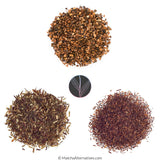
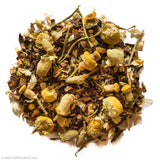
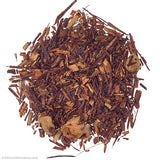


@Tanya we hope our email has helped answer your question! As it was quite long I’ll put a shorter answer here for everyone else: first we cannot diagnose, treat, or in any other way discuss a specific pathology (disease or healthcare issue) for any individual (only your healthcare professional can do that!). After that is clear, phytoestrogens are present in varying amounts in nearly all plants- including vegetables we eat as part of our normal meals. The concern about phytoestrogens developed due to the trend increase in soy products. We would say that “the dose makes the poison” (a toxicology turn of phrase). To consume some rooibos tea in amounts that are considered dietary (1-2 cups per day) and not medicinally interventional, there shouldn’t be anything to worry about but you would need to confirm this with your own healthcare professional. We are talking generally here. Other foodstuffs, like soy protein isolate can be a concern for hormone imbalance. Thanks for your comment!
Vientiene, co-founder
Hello
I was wondering what effect rooibos tea would have on me if I’m estrogen dominant with uterine fibroids.
Thank you
Tanya Stone
@AEN – Thank you for your comment and question! That doesn’t sound like a fun experience. Here are our two cents: we have never known of rooibos or any of the milder estrogenic herbs to cause such a reaction but in herbalism levels of constituents can vary by batch. While quite unlikely, it’s possible you got a batch with a higher level of estrogenic compounds. HOWEVER, the odds of this being the only contributing factor are extremely low. The most likely thing we can think of would be if you are on any kind of hormone therapy or medications, that could possibly explain the reaction, as herb-drug interactions could have an impact on the body’s response to herbs with any amount of estrogenic action. And that is something to be taken on a case by case basis with your health practitioner as getting into the realm of combining herbs which have similar actions (or opposing actions) to medications is a whole corner of the medical science world itself!
There could be other factors too, such as allergies to rooibos or the batch possibly being contaminated with other herbs or substances – extremely rare with loose leaf teas (and why it’s so important to buy good quality loose leaf), but more common in bagged teas or encapsulated substances.
I hope this helps and that you can figure out what your body was reacting to! Happy steeping :-)
Elizabeth Taeed, co-founder
Thank you for this good info. However, I am so confused. I had a few days last week when I had been drinking 2-3 cups of Rooiobs tea per day. I became extremely agitated. I did not feel safe to be driving. I googled Rooibos and found that is could mess with estrogen levels. I immediately stopped drinking the tea and am now fine. Generally speaking now, I am very confused about what to make of any estrogenic foods. It was a scary situation.
AEN